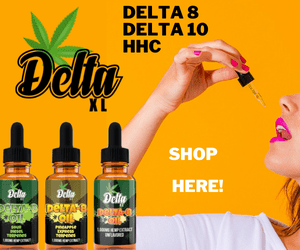Is Delta 8 legal in North Carolina? The short answer is yes.
Cannabinoids, terpenes, flavonoids, isomers, and salts produced from hemp are completely lawful on both the state and federal levels. As a result, you are free to engage in any activity related to delta-8 THC, including its use, possession, sale, distribution, and production, without fear of legal repercussions.
Delta-8 THC may only be produced from hemp plants that have less than the 0.3% THC allowed by law. But, why? Because the 0.3% threshold distinguishes hemp from marijuana, which contains delta-9 THC, which remains a Schedule I restricted drug.
As you can see, things aren’t as clear-cut as they might first appear to be. Keep on reading to learn all about the legality of Delta 8 THC and its siblings, Delta-9 and Delta-10 THC in North Carolina. [is delta 8 legal in North Carolina]
Understanding Delta 8 THC
In recent years, a new strain of THC, which you can now buy in a number of states, including North Carolina, has seen a meteoric spike in popularity.
Delta-8 tetrahydrocannabinol is yet another psychoactive molecule that manufacturers derive from cannabis. Delta-9 tetrahydrocannabinol is the predominant form of THC that you can find in cannabis and is mostly responsible for producing intoxication.
The fundamental difference between the two is in their chemical structure; as a result, delta-8 attaches to brain receptors differently than delta-9 and is thought to be weaker as a result. Anecdotal reports suggest that delta-8 users have a milder high than those who use other drugs.
Delta-8 has been estimated to be between 66% and 75% as strong as delta-9, although estimations vary.
Is Delta 8 Legal in North Carolina: Navigating North Carolina’s Delta-8 Laws
The Agriculture Improvement Act, more famously known as the 2018 Farm Bill, was passed and signed into law by the United States government in 2018. In a historic move, this bill made it lawful in all 50 states and the District of Columbia to sell goods containing cannabinoids produced from hemp.
North Carolina Senate Bill 352 was approved after the federal Farm Bill became law. Legislative Bill 352 removed delta-8 and delta-10 tetrahydrocannabinols, both of which are produced from hemp, from the North Carolina Controlled Substances Act. This implies that under state law, both delta-8 and delta-10 THC may be legally possessed and dispensed.
Does That Make Recreational and Medical Marijuana Legal in North Carolina?
Unfortunately, no. Marijuana use for either recreational or therapeutic purposes is not permitted in North Carolina.
If you get arrested with less than half an ounce of marijuana, you will face with a $200 misdemeanor fine. 45 days in prison and a $1,000 fine is the penalty for possessing between half an ounce and one and a half ounces of marijuana.
It is a crime punishable by up to 8 months in jail and a $1,000 fine to be in possession of between 1.5 ounces and 10 pounds of marijuana.
Legal Cannabis: The differences Between CBD and THC
CBD, or cannabidiol, and THC, or tetrahydrocannabinol, are two of the most prominent cannabinoids present in cannabis Sativa. Cannabinoids, the class of chemicals responsible for cannabis’s effects, include both of them.
The popular assumption is that CBD does not cause intoxication because of the way it interacts with brain receptors. In contrast, THC is the primary psychoactive component in cannabis plants and is responsible for the intoxicating effects of smoking or consuming marijuana.
To set the record straight, while the names are sometimes used interchangeably, cannabis and marijuana are not the same substance. Marijuana, or cannabis, is a plant that comes from the cannabis sativa family. In addition to marijuana, cannabis sativa also gives rise to hemp.
The ratio of cannabidiol (CBD) to tetrahydrocannabinol (THC) is the primary distinction between Marijuana, because its greater content of THC, may cause intoxication. But hemp, thanks to its higher percentage of CBD and very low concentration of THC (less than 1%), can have the opposite effect.
Can I Bring In Delta-8 to North Carolina?
Yes. You may bring delta-8 into North Carolina in compliance with state and federal law if it comes from hemp plants with less than 0.3% THC.
The same holds true for taking delta-8 goods outside of North Carolina. Make sure that using and possessing delta-8 items is legal in the state you’re visiting in the United States. Eighteen US states have bans or restrictions on delta-8 as of right now.
Can You Bring in Delta-8 THC From Marijuana to North Carolina?
On the other hand, you cannot enter the state while in possession of delta-8 THC, which comes from marijuana.
It all comes back to any THC or CBD product manufactured from the marijuana plant. After all, recreational and medicinal marijuana is currently illegal in North Carolina.
Is Delta-10 THC Allowed by Law in North Carolina?
Yes. The same holds true for delta-10 in North Carolina as it does for delta-8.
Delta-10 must come from hemp plants that have less than the 0.3% THC allowed by the Farm Bill in order to be protected by state and federal law.
Is Cannabidiol (CBD) Legal in North Carolina?
Yes. Under both state and federal law, cannabidiol and CBD products may be bought, used, possessed, sold, distributed, and manufactured in North Carolina.
In order for CBD products to be lawful in the state, they must be generated only from hemp plants with less than 0.3% THC.
Delta 8 Legality and North Carolina Cannabis Laws: Simplified
So, where do you see delta-8 THC going from here in North Carolina? To put it simply, we have no idea.
Is Delta 8 legal in North Carolina? Yes, for now. So, we suggest you take advantage of the situation and go out and have fun. We hope that our guide has put some of your worries to rest.
Next, you’ll want to keep up to date with the latest news, so we suggest checking out the rest of our blog for all the hemp tips and advice you need. Don’t forget to browse our our entire delta 8 collection.



